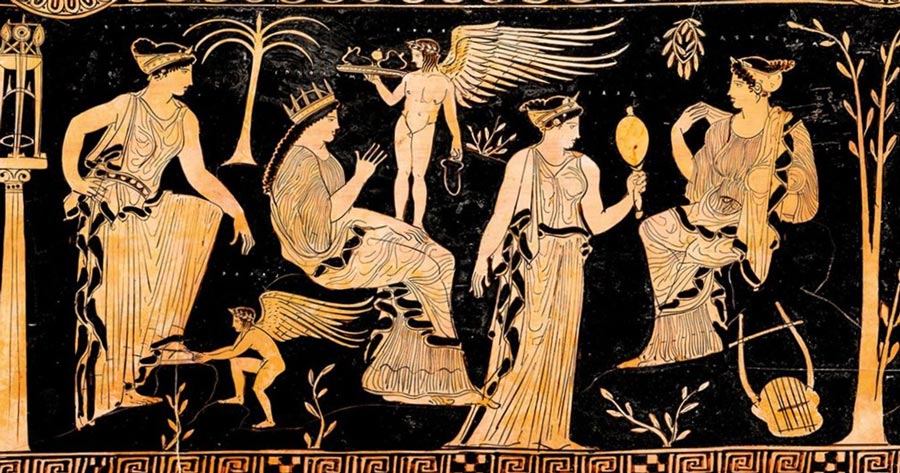In ancient times, health was seen as a balance. Health and medicine were linked to spiritual beliefs and the cause of an illness, for example, could be due to the presence of an evil spirit.
In the patriarchal society of Ancient Greece, girls were owned by their fathers and wives by their husbands. They had no money or property over the land or their own bodies. How then were they going to control their health?
Women were seen as weaker, slower, little versions of the masculine human ideal. Deficient and defective precisely because of their differences from men. But in their difference, women possessed the most useful and mysterious of organs: the uterus. Human dissections were prohibited so they didn’t know precisely where the organs were located, how the blood circulated or how breathing occurred. They didn’t know about cells, neurons, or hormones. Their knowledge of female physiology was based on the fact that they were wet because they had a lot of blood, they obviously came to this conclusion, because women menstruate.
Next we are going to see what the theories of some thinkers of that time were like. Let’s start with Hippocrates who emphasized the need to treat women’s bodies and illnesses differently from men’s. For him, “women’s diseases” required special and specific approaches to healing. He defended the idea that all diseases of women were due to their reproductive functions. He created the myth about the “wandering womb”, that is the uterus seen as a kind of animal that was capable of wandering inside the woman’s body and causing disease.
Different physicians in Ancient Greece and Rome held different views on the wandering womb. The uterus was considered to be the dominant force behind many diseases, ailments and symptoms in women. At that time, women were under the domain of male authority and medical authority legitimized this by making women’s bodies subservient to the whim of the very organ that defined their social purpose.
Years later, Platon described the womb as a living creature that became “annoyed and offended” if its wishes for motherhood were not fulfilled. Centuries later, for Soranus of Ephesus, the “wandering uterus” didn’t sit well with him. He didn’t agree that biological differences made women naturally inferior or defective. For Soranus disease was a universal human condition caused by different states of relaxation and oppression within the body. Diseases such as “suffocation of the womb” were caused because the uterus was pressured by inflammation caused by menstrual problems or difficulties in childbirth.
At that time we had Galen who also assumed the theory of Hippocrates on the four humors, where according to this theory the disease was caused by the imbalance of the four essential substances of the body: blood, phlegm, yellow bile and black bile. For him, women menstruated because they did not have enough heat to get rid of the bad and excessive humors.
Can you imagine that today we think that breast cancer is due to the fact that our uterus moves and is placed in one of our breasts to cause harm?
Or that because we have an imbalance between the humors described by Hippocrates that we develop cancer?
Humanity has always been advancing piecemeal and the sciences with it.
Humanity still has a long way to go and the sciences to discover.
References:
Cleghorn, E. (2021). UNWELL WOMEN. A Journey Through Medicine and Myth in a Man-Made World. The Orion publishing group.
García & Pérez. (2018). Las ‘mentiras’ científicas sobre las mujeres. Catarata.



